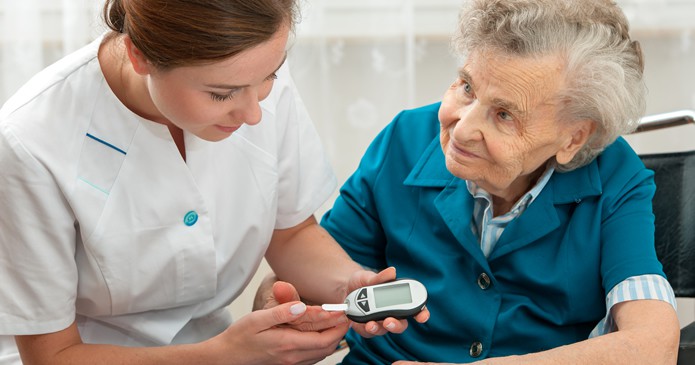
Diabetes Doctor-Approved Home Care Strategies: A Comprehensive Guide
Managing diabetes is a lifelong commitment, demanding consistent effort and informed choices. While medical interventions are crucial, effective home care strategies play a pivotal role in controlling blood sugar levels and preventing complications. This comprehensive guide, informed by the expertise of diabetes doctors, outlines practical steps you can take at home to improve your health and well-being. It is designed to empower individuals with diabetes to actively participate in their care and achieve optimal health outcomes.
The information provided is intended for general knowledge and informational purposes only, and does not constitute medical advice. It is essential to consult with a qualified healthcare professional for any health concerns or before making any decisions related to your health or treatment.
Understanding the Importance of Home Care in Diabetes Management
Diabetes management extends far beyond doctor’s appointments and medication schedules. The daily choices you make significantly impact your blood glucose levels and overall health. Home care strategies provide the framework for consistent monitoring, healthy eating, regular physical activity, and stress management. This proactive approach can lead to improved blood sugar control, reduced risk of complications, and enhanced quality of life. Consistent implementation of these strategies is a key component to successful diabetes management.
Monitoring Blood Glucose Levels: A Cornerstone of Home Care
Regular blood glucose monitoring is essential. It provides valuable insights into how your body responds to food, exercise, and medication. Knowing your blood sugar levels allows you to make informed decisions about your daily routine and adjust your treatment plan as needed. This proactive approach is one of the fundamental diabetes doctor-approved home care strategies.
The Importance of Regular Testing
Your doctor will advise you on how often to test your blood sugar, which can vary depending on your diabetes type, treatment plan, and individual needs. Generally, individuals taking insulin should test more frequently than those managing diabetes with oral medications or lifestyle changes. Keep a detailed log of your blood sugar readings, including the time of day, and any relevant factors like food intake or exercise. Share this log with your healthcare provider during your appointments to facilitate a more effective treatment plan.
Choosing the Right Blood Glucose Meter
Select a blood glucose meter that is accurate, easy to use, and fits your lifestyle. Many meters offer features like memory storage, data downloading capabilities, and alternate site testing. Discuss your options with your doctor or a certified diabetes educator to determine the best meter for your needs. Make sure you understand how to properly use and maintain your meter to ensure accurate readings. Regularly calibrate the meter to ensure it is functioning correctly.
Dietary Strategies: Fueling Your Body for Optimal Health
Nutrition plays a critical role in managing diabetes. A well-balanced diet can help control blood sugar levels, maintain a healthy weight, and reduce the risk of complications. Working with a registered dietitian or a certified diabetes educator is highly recommended to develop a personalized meal plan that meets your individual needs and preferences. This is one of the most important diabetes doctor-approved home care strategies.
Carbohydrate Counting and Portion Control
Carbohydrates have the most significant impact on blood sugar levels. Learning how to count carbohydrates and control portion sizes is a crucial skill for individuals with diabetes. Focus on consuming complex carbohydrates, such as whole grains, fruits, and vegetables, which are digested more slowly and cause less dramatic blood sugar spikes. Be mindful of added sugars and processed foods, which can quickly elevate blood glucose levels. [See also: Carbohydrate Counting for Beginners]
Making Healthy Food Choices
Prioritize foods that are rich in fiber, such as fruits, vegetables, and whole grains. Fiber helps slow down the absorption of sugar and improves blood sugar control. Choose lean protein sources, such as poultry, fish, beans, and tofu. Limit your intake of saturated and trans fats, which can increase your risk of heart disease. Drink plenty of water throughout the day to stay hydrated and support overall health.
The Power of Physical Activity: Moving Towards Better Health
Regular physical activity is a cornerstone of effective diabetes management. Exercise helps improve insulin sensitivity, allowing your body to use insulin more effectively. It also helps control blood sugar levels, manage weight, and reduce the risk of cardiovascular disease. Incorporating regular exercise into your daily routine is one of the most beneficial diabetes doctor-approved home care strategies.
Types of Exercise
Aim for a combination of aerobic exercise and strength training. Aerobic exercise, such as brisk walking, jogging, swimming, or cycling, helps improve cardiovascular health and control blood sugar levels. Strength training, such as weightlifting or resistance exercises, helps build muscle mass, which can improve insulin sensitivity and boost metabolism. Aim for at least 150 minutes of moderate-intensity aerobic exercise or 75 minutes of vigorous-intensity aerobic exercise per week, along with strength training exercises at least two times per week. Discuss with your doctor before starting any new exercise program.
Exercise Safety and Precautions
Before starting any exercise program, consult with your doctor to ensure it is safe for you. Check your blood sugar before, during, and after exercise to monitor its effects. Carry a source of fast-acting carbohydrates, such as glucose tablets or juice, in case your blood sugar drops too low (hypoglycemia). Stay hydrated by drinking plenty of water before, during, and after exercise. Wear appropriate footwear and clothing. Be aware of the signs and symptoms of hypoglycemia and hyperglycemia and know how to respond to them.
Medication Management: Adhering to Your Treatment Plan
If you are prescribed medications for diabetes, it is crucial to take them as directed by your doctor. Proper medication management is essential for maintaining blood sugar control and preventing complications. This is a vital part of diabetes doctor-approved home care strategies.
Understanding Your Medications
Learn about the medications you are taking, including their purpose, dosage, potential side effects, and how they interact with other medications. Ask your doctor or pharmacist any questions you have about your medications. Use a medication reminder system, such as a pill organizer or a smartphone app, to help you remember to take your medications on time. Never adjust your medication dosage without consulting your doctor.
Managing Insulin
If you take insulin, learn how to properly administer it, store it, and dispose of used syringes. Follow your doctor’s instructions for insulin dosage and timing. Regularly check the expiration dates on your insulin vials. If you experience any problems with your insulin, such as difficulty injecting it or unexplained blood sugar fluctuations, contact your doctor immediately. Insulin management is a crucial aspect of diabetes doctor-approved home care strategies.
Stress Management: Protecting Your Mental and Physical Health
Stress can significantly impact blood sugar levels. When you are stressed, your body releases hormones that can raise blood glucose levels. Managing stress is, therefore, an important component of diabetes care. Incorporating stress-reducing techniques into your daily routine can help you maintain better blood sugar control and improve your overall well-being. This is one of the often overlooked, but crucial diabetes doctor-approved home care strategies.
Stress-Reducing Techniques
Practice relaxation techniques, such as deep breathing exercises, meditation, or yoga. Engage in activities that you enjoy, such as listening to music, reading, or spending time with loved ones. Make time for hobbies and interests that bring you joy. Get enough sleep, as sleep deprivation can increase stress levels. Seek professional help from a therapist or counselor if you are struggling to manage stress. [See also: The Impact of Stress on Diabetes Management]
Foot Care: Preventing Complications
Diabetes can damage the nerves and blood vessels in your feet, increasing your risk of foot problems, such as ulcers and infections. Proper foot care is crucial for preventing these complications. This is a key element of diabetes doctor-approved home care strategies.
Daily Foot Care Routine
Inspect your feet daily for cuts, blisters, sores, redness, swelling, or any other changes. Wash your feet daily with warm water and mild soap. Dry your feet thoroughly, especially between your toes. Trim your toenails straight across. Wear properly fitted shoes and socks. Avoid walking barefoot, both indoors and outdoors. Report any foot problems to your doctor or podiatrist immediately.
Regular Check-ups: Working with Your Healthcare Team
Regular check-ups with your healthcare team are essential for managing diabetes effectively. These appointments allow your doctor to monitor your blood sugar levels, assess your overall health, and adjust your treatment plan as needed. This is a core element of diabetes doctor-approved home care strategies.
The Importance of Regular Doctor’s Appointments
Attend all scheduled appointments with your doctor, endocrinologist, and other healthcare providers, such as a podiatrist, ophthalmologist, and dentist. During your appointments, discuss any concerns or questions you have about your diabetes management. Have your blood sugar log and any other relevant information available. Participate actively in your care and ask for clarification if you don’t understand something. [See also: How to Prepare for Your Diabetes Check-up]
Eye Exams
Diabetes can damage the blood vessels in your eyes, leading to vision loss. Get a comprehensive eye exam annually to check for diabetic retinopathy and other eye problems. Early detection and treatment can help prevent or slow down vision loss. Eye exams are a part of the essential diabetes doctor-approved home care strategies.
Conclusion: Embracing a Proactive Approach
Successful diabetes management requires a comprehensive approach that incorporates medical care, lifestyle modifications, and consistent home care practices. By adopting these diabetes doctor-approved home care strategies, you can take control of your health and improve your quality of life. Remember to work closely with your healthcare team and to seek their guidance and support. With dedication and commitment, you can live a long and healthy life with diabetes. The most effective diabetes doctor-approved home care strategies involve a proactive approach to your health.
This guide provides a strong foundation for managing diabetes at home. Remember to consult with your healthcare provider for personalized recommendations. Consistent application of these diabetes doctor-approved home care strategies will help you live a healthier life.

